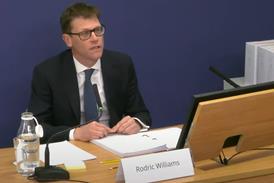The Solicitors Regulation Authority has decided to replace the technology behind the much-criticised mySRA portal after admitting that the system for online renewal of practising certificates is ‘neither straightforward nor simple’ to use.
The online system, which is also used to pay fees, has been in operation for three years.
During that time, solicitors have complained the system is prone to mistakes and slow to use, forcing the SRA to apologise when the renewal process has been delayed.
The new system, to be in place by October 2016, is the standout feature of the SRA’s new business plan for the next year, and the regulator promises solicitors will have a say in how it works.
The plan, published today, says: ‘A significant lesson learnt from the development and implementation of the current system is the need for us to engage early and in depth with the external users of the system during the analysis and development phase.’
According to the plan, the SRA will look again at the ‘volume and detail’ of information collected from solicitors and firms, with a view to reducing both.
The regulator has also vowed to start work by the end of this year on ensuring that its language and tone are ‘accessible and relevant’. Meanwhile, a series of roadshows by the middle of next year will collect views on how the SRA is perceived by solicitors.
From next month the regulator will start to make available open data sets with core information about firms to comparison sites. This will be extended to a new online regulatory register open to members of the public, expected to go live early in 2016.
The business plan also sets a series of performance targets. These include:
- At least 70% of calls to the contact centre to be answered within 60 seconds;
- Nine in 10 of what are considered low-risk applications for authorisation to be completed in 30 days and 90% of medium-/high-risk applications to be finished within three months.
Last week the SRA revealed that it takes an average of 550 days - 18 months - to issue proceedings in the Solicitors Disciplinary Tribunal.
In the future, it wants 90% of referrals made to the SDT within eight months.
The SRA is likely to reduce its income for 2014/15 by 10% from £52.8m to £47.5m.
Enid Rowlands (pictured), chair of the SRA Board from 1 January 2015, said next year’s target is a commitment to being ‘transparent, open and accessible, ensuring genuine engagement and involvement’.
She said: ‘I am determined we will continue to improve our operational performance through developing our IT, our people and our processes, and doing everything we can to enhance the experience of those we regulate, the public and our stakeholders.’
Andrew Caplen, president of the Law Society, said: ‘We welcome the commitment in the strategy to work with solicitors and companies. We will represent our members as the strategy is implemented to help ensure the right balance between regulatory burden and consumer protection.
‘We are pleased to note the SRA’s commitment to addressing the problems surrounding equality and diversity in the profession and will be keen to work with them on this.'

















![David Lester (senior partner at Blythe Liggins), Darryl Barnes, Jagdeep Sandher (head of dispute resolution at Blythe Liggins)[4]](https://d1d8vslyhr7rdg.cloudfront.net/Pictures/274x183/4/2/8/116428_davidlesterseniorpartneratblytheligginsdarrylbarnesjagdeepsandherheadofdisputeresolutionatblytheliggins4_981603_crop.jpg)






27 Readers' comments